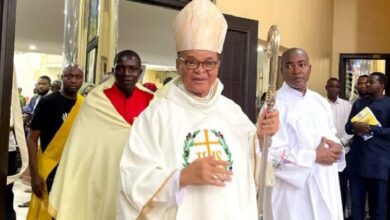Families urged to remain united
From Damian Avevor
Ghanaian families have been urged to remain united in true love, live in mutual understanding and contribute their best to inspire society with the best of family life.
This was contained in a Communiqué signed and read by Most Rev. Philip Naameh and Most Rev. Charles Palmer-Buckle, President and Vice of the Ghana Catholic Bishops’ Conference(GCBC) respectively at the closing of its Annual Plenary Assembly at Ho.
The closing Mass at the St. Francis of Assisi Parish at Ho- Kpevele was attended by a large number of lay faithful, Priests and Religious.
The theme for the 12-day Assembly was: Integral Pastoral Care for the Family in the light of Amoris Laetitia.
The Communique said the family remained the Domestic Church, the vital cell of society and it was in that the Good news of God’s love was known and lived, stressing that many Ghanaian families, by their witness to God’s will and love, build up the Church and Society.
According to the Bishops, given the importance of the family in the Church and Society at large, the pastoral care of the family was a shared responsibility that involves the Clergy and Religious, Marriage Counsellors, the Parish-church Community, Small Christian Communities (SCCs), couples and Associations of Families.
They indicated that “special attention need to be given to the formation of special agents to accompany the youth at their various stages of development, to assist their understanding of the Vocation of marriage and family life and the Religious Life so as to prepare adequately for it.”
The GCBC Communiqué touched on a wide range of issues on pastoral care in the light of Amoris Laetitia among which are the Situation of the family in Ghana, Gospel of the Family, Pastoral Interventions, and some General Pastoral Guidelines.
The Bishops noted that as Shepherds of the family of God, “we respectfully acknowledge that there are some difficult, irregular and imperfect situations of family that need the most attention and care.”
Some of the difficulties, they added, include families of migrant workers, those in prisons and Psychiatric Homes; families of alcoholics, families with handicapped children and terminally-ill members and single families.
The Communiqué outlined that trial marriages, free unions, separated or divorced persons who have not remarried, customarily or civilly remarried persons who have divorced and have remarried and homosexual unions were but some of the imperfect-irregular situations.
Outlining some pastoral interventions, the Bishops noted that “Preparation for marriage begins from childhood. The experiences of children from their family origin may be carried along to their own future families.”
They declared: “Those best prepared for marriage are probably those who learned what Christian marriage is from their own parents, who chose each other unconditionally and renew daily that decision.”
They said parents and pastoral agents must intervene to effect this mandate in the life of children, while in preparing prospective couples, pastoral agents and Marriage Counsellors should assist them to recognise the good and bad times of marriage.
They must be encouraged to discuss honestly what each expected from marriage, their understanding of love and commitment and what kind of life they would want to build together.
“The decision to marry should never be encouraged unless the couple has discerned deeper reasons that will ensure a genuine and stable commitment. In the light of the demands of this stage, we direct that all proximate preparations for marriages shall take normally six months in the Catholic Church in Ghana,” stated the Bishops.
According to them, in their preparation for marriage, the couple must be encouraged to see the Sacrament not as a single moment that becomes a part of a past and its memories, but a reality that permanently influences the whole married life.
They are to be encouraged to make the liturgical celebration a profound personal experience and to appreciate the meaning of the signs, they added.
They stressed that “the words of consent (Marriage Vow) could not be reduced to the present but they involve a totality that includes the future: until death do us Part,” encouraging less expensive wedding ceremonies.
The Communiqué opined that as the years of marriage roll on, a couple’s experience of love might grow stagnant and lose the very excitement that should be its propelling force, encouraging those who accompany couples in their marriages to teach them that love needs time and space, time to talk things over, to share plans, listen to and appreciate one another and build a stronger relationship.
The Bishops noted that through these, couples would learn how to plan and spend free time together, share moments of recreation with children, celebrate important events together and share opportunities for their spiritual growth.
On the care for difficult and irregular situations of marriage, the Bishops stressed that special discernment was indispensable for persons in this category and care givers must regard such persons as part of the ecclesial community and not as excommunicated.
They urged Ghanaians to avoid language or conduct that discriminates but show them respect, make the efforts to reconcile and mediate through neutral and impartial intervention.
It should be noted that Christian Community’s care for such persons was not to be considered a weakening of its faith and testimony to the indissolubility of marriage; rather such is a particular expression of its charity.
